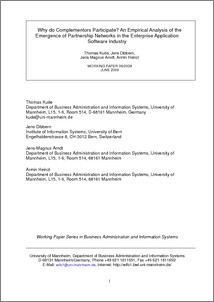|
Why do complementors participate? : an empirical analysis of the emergence of partnership networks in the enterprise application software industry
Kude, Thomas
;
Dibbern, Jens
;
Arndt, Jens-Magnus
;
Heinzl, Armin
![[img]](https://madoc.bib.uni-mannheim.de/style/images/fileicons/application_pdf.png)  Vorschau |
|
PDF
Working_Paper_6_2009.pdf
- Veröffentlichte Version
Download (175kB)
|
|
URL:
|
https://ub-madoc.bib.uni-mannheim.de/2371
|
|
URN:
|
urn:nbn:de:bsz:180-madoc-23718
|
|
Dokumenttyp:
|
Arbeitspapier
|
|
Erscheinungsjahr:
|
2009
|
|
Titel einer Zeitschrift oder einer Reihe:
|
None
|
|
Sprache der Veröffentlichung:
|
Englisch
|
|
Einrichtung:
|
Fakultät für Betriebswirtschaftslehre > Sonstige - Fakultät für Betriebswirtschaftslehre
|
|
MADOC-Schriftenreihe:
|
Area Information Systems and Institute for Enterprise Systems > Working Papers Lehrstuhl für ABWL und Wirtschaftsinformatik (Heinzl) (bis 2011)
|
|
Fachgebiet:
|
330 Wirtschaft
|
|
Normierte Schlagwörter (SWD):
|
Anwendungssoftware , Unternehmen , Serviceorientierte Architektur , Hub-and-Spoke-System
|
|
Freie Schlagwörter (Englisch):
|
Enterprise Application Software Industry , Small and Medium Sized Enterprises , Partnership Networks, Complementarity , Dynamic Capabilities
|
|
Abstract:
|
The enterprise application software industry is currently undergoing profound changes. The well-established, large providers (hubs) are fostering partner networks with small complementors (spokes). This paper takes the perspective of these spokes and seeks to understand their motivations for partnering. Drawing on research on dynamic capabilities and complementarity, an explanatory model of the spokes’ motivation to partner is developed. It is argued that partnering is especially attractive for smaller organizations when it enables them to access the hub’s complementary commercial, technological, and social capital. The model is empirically examined through a post hoc analysis of 17 small enterprises. The study reveals that the hub’s reputation as part of its social capital as well as its commercial capital indeed act as reasons to participate in partnership networks. In contrast, the hub’s technological capabilities may be seen as a double-edged sword. While the hub’s capability to provide integrated systems was found to be a prime reason for partnering, its innovative capability may actually detain spokes from partnering. The negative influence of the hub’s innovativeness, however, was found to be contingent upon the type of solutions offered by hub and spoke. The same holds true for the positive effect of the hub’s commercial capital.
|
 | Das Dokument wird vom Publikationsserver der Universitätsbibliothek Mannheim bereitgestellt. |
 Suche Autoren in Suche Autoren in
Sie haben einen Fehler gefunden? Teilen Sie uns Ihren Korrekturwunsch bitte hier mit: E-Mail
Actions (login required)
 |
Eintrag anzeigen |
|
|



 Suche Autoren in
Suche Autoren in